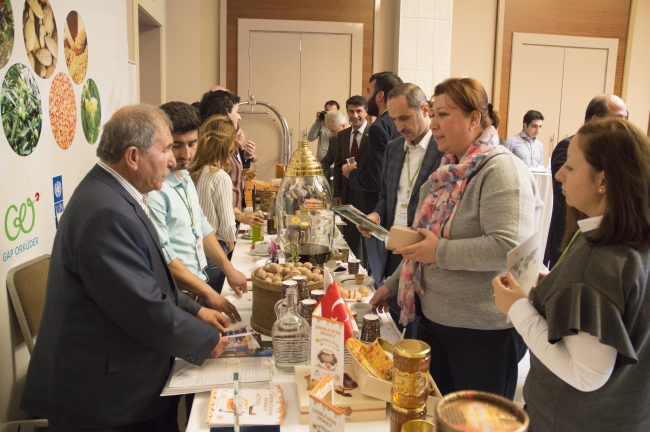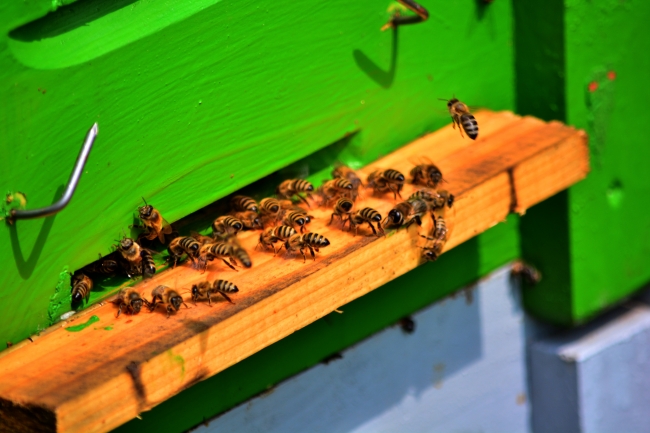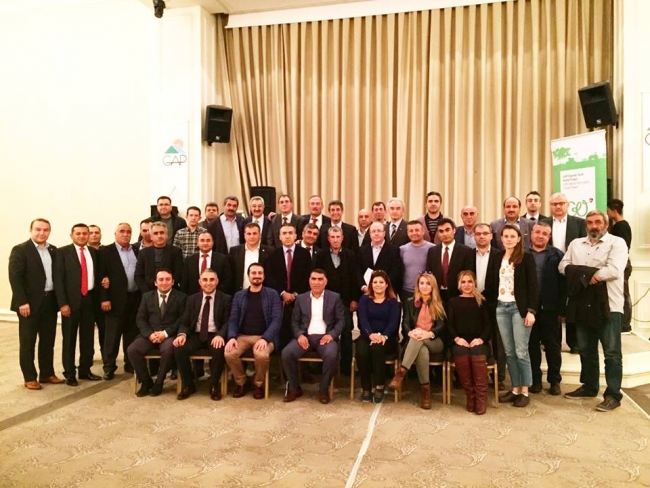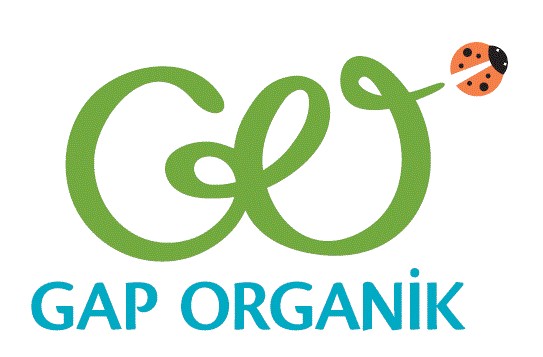GAP ORGANIC FARMING
|
To: |
T.C. Ministry of Development |
|
From: |
T.C. Ministry of Development GAP Regional Development Administration |
|
Subject: |
GAP Organic Farming Cluster Development Project |
|
Date: |
12.02.2018 |
|
GAP Organic Farming Cluster Project |
The GAP Organic Farming Cluster Project was implemented in the period 2009-2017 by the Ministry of Development South-eastern Anatolia Project Regional Development Administration (GAP RDA) with the technical support of the United Nations Development Programme (UNDP). The project budget was 6.5 million TL.
|
Overall Goal and Objective |
The project aims to enhance the competitive power of organic farming sector in South-eastern Anatolia Region and to contribute to the development of the region in a sustainable way and parallel to the principle of equality.
|
GAP Region Competition Agenda |
The project contributes to the “Cradle of Sustainable Civilizations” vision under the “Competition Agenda for South-eastern Anatolia” which was in turn developed by the Entrepreneur Support Centres Project (GAP-GİDEM) implemented in the period 2002-2007 by the GAP-RDA with the financial support of the European Union and technical support of the UNDP.
|
GAP Action Plan |
An important part of priority actions under the Competition Agenda for South-eastern Anatolia was included in the GAP Action Plan which was declared and put into effect in 2008 by the Government. In this context, the GAP Organic Farming Cluster Project aims to contribute, in line with priorities set by the GAP Action Plan, to the development of technical, physical, informational and institutional bases in the process of enhancing the competitiveness of organic farming sector in the region.

|
Cluster Roadmap and Common Vision |
The Cluster Roadmap, Value Chain and Cluster Analyses are outcomes of field work which lasted over a year and conducted through a bottom-to-top approach. The report presents the strategic road map that mobilizes GAP Organic Farming Cluster.
At the stage of analysis, 11 working, information building and focus group meetings were organized in 7 provinces with the participation and contribution of relevant organizations and agencies from 9 provinces of the region. Further, there were interviews with more than 100 agencies from the region and 50 national and international agencies all related to organic farming sector directly or indirectly. Besides South-eastern Anatolia, the field work also covered other regions of Turkey and some European countries as well.
The value chain analysis made under the project covered 45 products which were then reduced to 8 after the process of triple “filtering”. On the basis of available information, the filtering method was used to identify those products with highest comparative advantage in organic production under given circumstances.
The Roadmap prepared in 2011 with the participation of all stakeholders in organic agriculture sector defined the following vision for the Region adopted by stakeholders: “By 2023, turning the region into a leading attraction centre of Turkey with its vast and fertile irrigable land, a major supplier of organic textiles and foodstuffs, and innovative and competitive organic production.”
|
Methodology Adopted: Clustering |
“Realization of Economic Development” is one of the four strategic development axes identified by the GAP Action Plan which refers to the promotion of organic farming activities. In this context, it was decided to adopt and apply “Clustering Methodology” which is one of the modern local economic development models envisaging an integrated approach, innovation and competitiveness.
Clustering is an organizational model in which enterprises active in the same region, trade and value chain that both cooperate and compete and have commercial relations in-between as well as their supporting institutions (i.e. universities, public agencies, research institutions, professional associations, technology and innovation centres, banks, insurance companies, logistics firms, etc.) are brought together.
|
Project Components |
Component 1: Development of Scalable and Repeatable Success stories
1.1. Identification of pilot implementation basins and products
1.2. Preparation and implementation of pilot work plans
1.3. Developing and implementing a model for scaling and repeating
Component 2: Developing Production and Marketing Skills and Capacity
2.1. Development and work plan for Organic Farming Counselling and Extension Centre (OTADAM) model
2.2. Implementation of work plan
2.3. Creation of GAP Organic Farming Portal
Component 3: Advancing Cooperation of Actors
3.1. Setting up a cluster governance structure
3.2. Creating working groups, planning and implementation of their activities
|
Main Factors of Success |
- In attaining the goal specified in the common vision the following were identified as main factors of success:
- Scalable and Repeatable Success Stories
- Strong Production and Marketing Infrastructure
- Improvement of Cooperation of Actors
- Promotion of organic farming practices in the region.
|
Pilot Projects |
Although there are farmers engaged in organic farming as well as various enterprises processing organic products in South-eastern Anatolia Region, it is hard to say that there are success stories clearly demonstrating economic and social benefits associated with organic farming and thus encouraging such practices. It is thus targeted to contribute to the promotion of organic farming practices in the region by creating scalable and replicable success stories.
Project on Increasing Efficiency and Rising Value in Ilgın Village of Eğil District, Diyarbakır Province
Under the pilot project in Ilgın village of Eğil/Diyarbakır, the work on contracted processing and packing of organic lentil and chickpea was completed. The facility engaged in contracted processing was certified and trademark and barcode were registered on the name of Eğil.In line with relevant standards, both routine and packing materials were supplied. Further, filling and sealing machinery for manual filling were procured and delivered to the union. To ensure marketing by the union, contact was established with the Control and Certification Firm and the certificate issued earlier for Ilgın neighbourhood was replaced by another one issued for the union. Now there is a new certificate for the union to engage in marketing.
To diversify crop patterns and increase output three water wells were drilled; one yielding water 8 litres/second.Initiative was also taken to have the DSİ (State Hydraulic Works) to conduct its drillings and subsequent drillings indicated the existence of a source yielding 9 litres/second.
A pilot project in Eğil/Diyarbakır was developed in the context of Coca Cola and UNDP’s “New World: Inclusive Sustainable Human Development Initiatives.” The project was presented to and accepted by the initiative. The project envisages the construction of a water storage pool and conveying water to plots of union member farmers four irrigation. The project work was completed together with relevant technical specifications and irrigation infrastructure is ready. All related training activities were completed by April and opening organization took place in May 2017.

- Project on Increasing Competitive Power of Organic Olive Oil in Kilis Province
Under the project, an Integrated Organic Olive Processing, Packaging and Storing Facility with 600 m2 of covered space were built on 12,000 m2 large parcel belonging to the union in Kocabeyli village of Kilis. The project was modelled in a holistic manned with three major axes as structure, superstructure and technical support.
The total cost of the project is about 1.2 million USD.The project is carried out by on the basis of financial contribution by the GAP Administration, United Nations High Commissioner for Refugees and the Union. With its projects submitted to the Silk Road Development Agency, the Union is entitled to two olive press machines of continuous model each with capacity of processing 80 tons of oil a day. This will make possible to process, store, pack and market organic olive by a modern enterprise with its certificate.
Application was been made to the Turkish Patent and Trademark Institute for geographical indication “Kilis Organic Olive Oil,” Also completed is the label design with “Kilizi” logo on tin cans of 5, 10 and 17 kilogrammes. The checking and certification in terms of organic production of the facility and olive oil produced according to TR and EU standards is also ready.
The web design (www.kilizi.org) for the Kilizi Integrated Organic Olive Oil Facility and the Union with the financial contribution of the GAP Regional Development Administration, Silk Road Development Agency, United Nations High Commissioner for Refugees (UNHCR) and Kilis Province Organic Olive Farmers’ Union and technical support of the United Nations Development Programme (UNDP) is ready. Necessary updates are being made by specialists of the Union. An introductory brochure was also printed.
The ISO Quality Assurance Document (14000, 18000, 22000) of the facility is completed as of the end of November 2016.

- Pilot Project on Plant Protection and Biological Control through Organic Plant Nutrition and Organic Input Use in South-eastern Anatolia Region
The governance structure of the project was built by setting up a project coordination committee and working groups on project development and institutional capacity building. The work is being carried out through direct contact with all relevant institutions in the GAP Region and Adana. The project aims to close coordination gaps in this field and in organic input provision, plant nutrition and protection and biological control. In this context, trainings that are needed in the GAP Region are started along with funding initiatives by preparing projects on basic issues.
The project “Developing Biological Control Infrastructure in Pistachio: Anthocoris minki Dohrn Growing Facility” prepared by short-term experts and presented to the Silk Road Development Agency (DA) by the Pistachio Research Institute as a project with budget of 331,000 TL was found successful.
Projects supported by our experts were prepared and presented to the Karacadağ DA. Of these projects the one prepared by Dicle Organic Fruit Farmers Union, “Packing and Transforming into Organic Product of Fresh Tissue from Organic Chickpea, Wheat and Grapes” was found successful.
- Project on Training and Extension in Organic Cotton Farming in Diyarbakır Province
The project envisaged informing local farmers in Diyarbakır province about good farming practices by demonstrating all stages in organic cotton framing from sowing to harvesting and promotion of organic cotton farming and good practices in the region by training both farmers and relevant extension workers. Another objective of the project was ensuring inter-agency cooperation and building capacity. Since it was an agricultural training and extension project, it was carried out in cooperation with Agricultural Training and Extension Project (ATEP). Implementation took place in two different locations each with size of 25 decares.
The contribution of all relevant organizations particularly in the province of Diyarbakır was secured; inter-agency cooperation was improved and intensive trainings were delivered to technical staff, farmers and students (13 trainings reaching 618 people in total).
The dimension and depth of GAP-RDA and UNDP cooperation in the context of GAP-OFC (Organic Farming Cluster) Project was further enhanced. Projects developed in line with both local development/restructuring efforts and objectives envisaged under the GAP-OFC Project Road Map constitute fine examples of fundraising initiatives before national/international agencies (i.e. (Kilis Pilot Project-UNHCR- 1,200,000 USD and Diyarbakır Eğil District Ilgın Village Pilot Project-Coca Cola-110,000 USD.
- GAP Organic Farming Value Chain Pilot Practices Financial Support Programme
A series of meetings was held with Development Agencies of Dicle, Karacadağ and Silk Road in the region on 12 June 2014, 16 July 2014, 19 September 2014 and 29 September 2014 for preparing guides on GAP Organic Farming Value Chain Pilot Implementation Financial Support Programme. Draft guides prepared as outcome of these meetings to be implemented by Karacadağ and Silk Road Development Agencies were shared with the Ministry of Development in November 2014.
The first phase of the Financial Support Programme was started in 2015 under the coordination of the Ministry of Development South-eastern Anatolia Project Regional Development Administration in cooperation with Silk Road and Karacadağ Development Agencies. The Dicle Development Agency joined the team in the second phase. At present, the third phase is going on with the Silk Road Development Agency.
The programme aims to contribute to the strengthening of Organic Farming Value Chain in the GAP Region and to enhancing its competitiveness at both national and international levels.
Specific objectives of the programme: Besides strengthening Organic Farming Value Chain in the GAP Region, developing sustainable regional, national and international cooperation of actors in Organic Farming Value Chain; improving the competitiveness and efficiency of Regional Organic Farming Value Chain; and developing sustainable and market-focused regional and/or inter-regional commercial cooperation among economic actors in the region (farmers’ unions, processors, retailers, etc.).
The total budget allocated to the GAP for the years 2015 and 2016 is 9 million TL.
As included in the programme guidelines, the GAP-OTADAM (GAP Organic Farming Counselling and Extension Centre) Program provided free technical referral and information services to applicants for ensuring high quality offers in line with sector priorities, needs and regional potential. Besides, both agencies extended Help Desk services in issues related to project development and management.
In compliance with regional and sectorial objectives mentioned above, the GAP Organic Farming Value Chain Pilot Implementation Financial Support Programme is implemented within the framework of a multi-year programming by the Silk Road Development Agency, Karacadağ Development Agency and Dicle Development Agency in coordination with the GAP Administration so as to cover the provinces of the region. 34 pilot projects were implemented under various programmes.

|
INSTITUTIONALIZATION |
The technical support provided by the GAP-OFC and GAP-RDA to the operation of cluster governance must be more intensive and for a term as long as possible to ensure the sustainability of governance structure and institutionalization.
- Cluster Institutionalization,
- Comparing clusters and cluster management we find that
- Acquisition of legal status is a precondition for cluster institutionalization and success.
- Institutionalization and financial sustainability of clusters go hand in hand mutually supporting each other.
The Executive Board of GAP Organic Farming Clustering Initiative took the following decisions in its meeting on 15 June 2015:
- Adoption of legal identity for the institutionalization and sustainability of the GAP-OFC Project,
- To have the form of this identity as an association, “GAP Organic Cluster Association”.
- Five working groups in the context of thematic specialization were later reduced to two:
- Organic Food Working Group
- Organic Textiles Working Group
The cluster was set up in June 2016. This will allow for evolution towards sub-clusters planned for the future.
- The GAP organic Farming Cluster was awarded “Bronze Label of Cluster Excellence” by the European Secretariat for Cluster Analysis (ESCA).


















